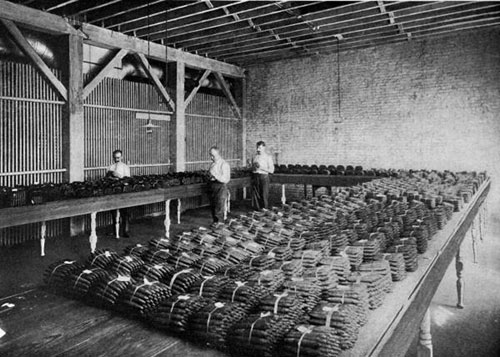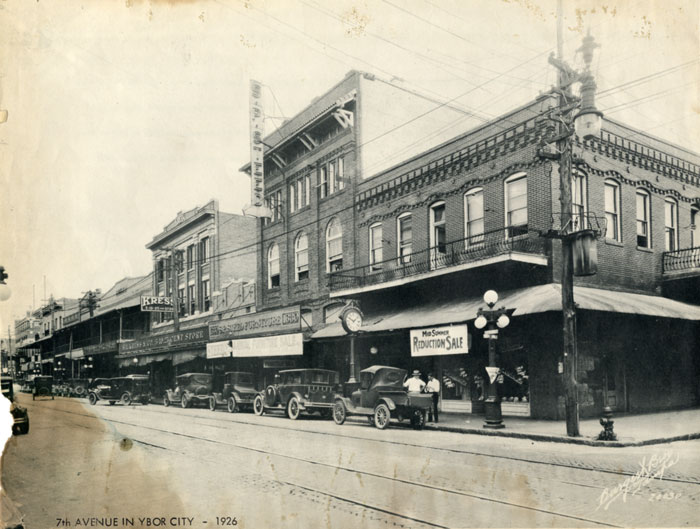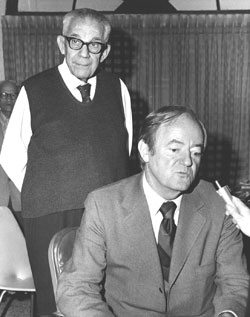Victoriano Manteiga
Victoriano Manteiga
Victoriano Manteiga, the legendary founder and editor of La Gaceta, sailed to Tampa from Cuba in 1913. Born in Cuba in 1893 he came to a city that was vibrant, growing, and had long established ties to Cuba. It seemed a logical place to be for a young Latino in search of a greater life. When he landed in Tampa he had a ten dollar bill and two white, linen suits to his name. He rented a room on the upper story of El Encanto Cleaners and on his second day in the city went to work in The Morgan Cigar Factory in West Tampa as a reader.
It was on the cigar industry that Victoriano Manteiga came to be known as an intellectual. As a reader to the cigar factory workers, his job was not to read the materials in monotone voice, but to be adaptable enough to give feeling to the most touching novel, and fervor to the most impassioned political appeals. Printed matter in English often had to be translated on the spot. Not an easy task, for he had to fully grasp their meanings in order to effectively convey them.
A bus boy from Las Novedades Restaurant many years ago, once reminisced about watching Victoriano come in, sit at a table with other readers, and hold discussions as everyone gathered around to listen to them. The restaurant, brimming with aromas of Latin cuisine and Cuban coffee, served as their pulpit.
Manteiga received 25 cents every Friday from each cigar maker he read to, a tidy sum for the early 20th century. Unfortunately, the cigar industry in both Tampa and Cuba was plagued by strikes. Naturally, when cigar workers went on strike, the readers would also be off the payroll. Although the Latin community had set up mutual aid societies which were invaluable to a good portion of the population in times of need, the increasing unpredictability of the strikes gave Victoriano cause for concern.
By the end of the 1920 strike, cigar factories belonging to the Cigar Manufacturer’s Association no longer allowed readers in their shops. The position of the reader, once considered a right of cigar makers, was being threatened.
Factory owners considered them to be at the root of their labor problems due to the emphasis lectors placed on the reading of liberal publications. The era of the elite reader corps seemed to be coming to an end.
In light of these developments Victoriano was in need of more secure employment. He went back to Cuba to look for work but quickly returned disappointed. Although the position of the reader in Cuba was stronger, corruption abounded and future conflicts seemed inevitable.
He returned to Tampa where the economy appeared to be on the upswing. An increasing number of tourists were coming in, many choosing to stay. Real estate activity was on the rise, and Tampa’s population was booming. The time seemed ripe for new enterprise.
By 1922 Victoriano had already married a young lady named Ofelia and had a young son named Roland. He decided it was time to look outside the cigar industry for employment so he decided to discuss his idea of publishing a Spanish newspaper with Dr. Jose Avellanal, an admired doctor and humanitarian. Notwithstanding the obvious potential and risks involved in a quality publishing effort, the good doctor was inclined to help. Dr. Avellanal contacted the Mascunana Printers and in the same year their combined efforts yielded the first issue of La Gaceta.
La Gaceta was well received by the community. In a very short time Manteiga earned respect for his entrepreneurial and journalistic abilities. He received a commendation from the Florida Governor Spessard L. Holland in 1941 for his loyalty, patriotism, fidelity and prudence. Little did he know then, but this was to be just one of the many awards and recognitions he, his son Roland, and his grandson Patrick would receive in connection with their work on behalf of La Gaceta.











